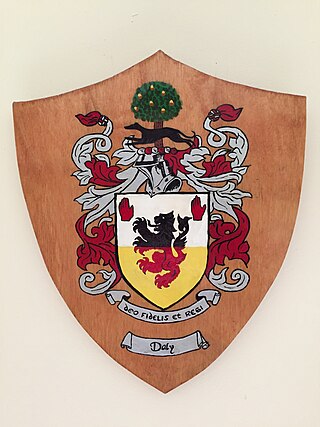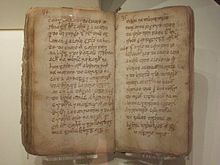
In Celtic cultures, a bard is a professional story teller, verse-maker, music composer, oral historian and genealogist, employed by a patron to commemorate one or more of the patron's ancestors and to praise the patron's own activities.

Clan Donald, also known as Clan MacDonald, is a Highland Scottish clan and one of the largest Scottish clans. The Lord Lyon King of Arms, the Scottish official with responsibility for regulating heraldry in that country, issuing new grants of coats of arms, and serving as the judge of the Court of the Lord Lyon, recognises under Scottish law the High Chief of Clan Donald. Historically the chiefs of the Clan Donald held the title of Lord of the Isles until 1493 and two of those chiefs also held the title of Earl of Ross until 1476.
Alasdair mac Mhaighstir Alasdair, legal name Alexander MacDonald, or, in Gaelic Alasdair MacDhòmhnaill, was a Scottish war poet, satirist, lexicographer, political writer and memoirist. The poet's Gaelic name means "Alasdair, son of the Reverend Alasdair". His father, also named Alasdair, was known as Maighstir Alasdair which was then the way of referring to a clergyman in Scottish Gaelic. In English, Maighstir Alasdair was known as the "Reverend Alexander MacDonald".
Gofraid mac Fergusa is an alleged ninth-century figure attested by the Annals of the Four Masters and various pedigrees concerning the ancestors of Clann Somhairle and Clann Domhnaill. If the pedigrees are to be believed, he was a son of Fergus mac Eirc, and a descendant of Colla Uais. Likewise, the two annal-entries that note Gofraid mac Fergusa claim that he was an Airgíallan ruler, who aided Cináed mac Ailpín in 835, and died sixteen years later as a ruler of the Isles. Gofraid mac Fergusa's place in the aforesaid pedigrees is chronologically impossible. The events associated with him by the annals are not supported by any contemporary or near contemporary source. In fact, the two annal-entries that recount these alleged events are fabricated additions inserted into the chronicle at some point before the mid seventeenth century.

Culture of Scotland in the High Middle Ages refers to the forms of cultural expression that come from Scotland in the High Medieval period which, for the purposes of this article, refers to the period between the death of Domnall II in 900, and the death of Alexander III in 1286. The unity of the period is suggested by the immense breaks which occur in Scottish history because of the Wars of Scottish Independence, the Stewart accession and transformations which occur in Scottish society in the fourteenth century and afterwards. The period differentiates itself because of the predominance of Gaelic culture, and, later in the medieval, Scoto-Norman French culture.
Donnchadh Mór Ó Dálaigh was a celebrated Irish poet, and master of the Irish classical style called Dán Díreach, who died in 1244. Mor is the Irish word for "great".
Muireadhach Albanach Ó Dálaigh was a Gaelic poet and crusader and member of the Ó Dálaigh bardic family.

The Ó Dálaigh were a learned Irish bardic family who first came to prominence early in the 12th century, when Cú Connacht Ó Dálaigh was described as "The first Ollamh of poetry in all Ireland".

Clan Macdonald of Clanranald, also known as Clan Ranald,, is a Highland Scottish clan and a branch of Clan Donald, one of the largest Scottish clans. The founder of the Macdonalds of Clanranald is Reginald, 4th great-grandson of Somerled. The Macdonalds of Clanranald descend from Reginald's elder son Allan and the MacDonells of Glengarry descend from his younger son Donald. The clan chief of the MacDonalds of Clanranald is traditionally designated as The Captain of Clanranald and today both the chief and clan are recognised by the Lord Lyon King of Arms, the heraldic judge in Scotland.

Clan Macdonald of Sleat, sometimes known as Clan Donald North and in Gaelic Clann Ùisdein[kʰl̪ˠan̪ˠ ˈuːʃtʲɛɲ], is a Scottish clan and a branch of Clan Donald—one of the largest Scottish clans. The founder of the Macdonalds of Sleat was Ùisdean, or Hugh, a 6th great-grandson of Somerled, a 12th-century Lord of the Isles. The clan is known in Gaelic as Clann Ùisdein, and its chief's Gaelic designation is Mac Ùisdein, in reference to the clan's founder. Both the clan and its clan chief are recognised by the Lord Lyon King of Arms, who is the heraldic authority in Scotland.

Clan MacDonald of Keppoch, also known as Clan MacDonellof Keppoch or Clan Ranald of Lochaber, is a Highland Scottish clan and a branch of Clan Donald. The progenitor of the clan is Alistair Carrach MacDonald, 4th great-grandson of the warrior Somerled. The clan chief is traditionally designated as the "Son of Ranald's son".
Bardic poetry is the writings produced by a class of poets trained in the bardic schools of Ireland and the Gaelic parts of Scotland, as they existed down to about the middle of the 17th century or, in Scotland, the early 18th century. Most of the texts preserved are in Middle Irish or in early Modern Irish, however, even though the manuscripts were very plentiful, very few have been published. It is considered a period of great literary stability due to the formalised literary language that changed very little.
Scottish Gaelic literature refers to literary works composed in the Scottish Gaelic language, which is, like Irish and Manx, a member of the Goidelic branch of Celtic languages. Gaelic literature was also composed in Gàidhealtachd communities throughout the global Scottish diaspora where the language has been and is still spoken.
Clann Somhairle, sometimes anglicised as Clan Sorley, refers to those Scottish and Irish dynasties descending from the famous Norse-Gaelic leader Somerled, King of Mann and the Isles, son of Gillabrigte (†1164) and ancestor of Clann Domhnaill. Primarily they are the Clan Donald, formerly known as the Lord of the Isles, and the mainland Clan MacDougall, and all their numerous branches. Clan Macruari are their lost sept.
MacMhuirich is a masculine surname in Scottish Gaelic. The feminine form of the surname is NicMhuirich. The masculine form translates into English as "son of Muireach", and the feminine name translates as "daughter of MacMhuirich". The personal name Muireach means "mariner". The surname has been borne by a noted Hebridean family of bards, who claimed descent from an early 13th-century Irish bard.
Aonghus Ó Dálaigh was an Irish poet.

The Books of Clanranald are two paper manuscripts that date to about the early 18th century. The books are written in Classical Gaelic, and are best known for their traditional account of the history of Clan Donald. The manuscripts are commonly referred to as the Red Book and the Black Book. The name "Red Book", however, may actually be a misnomer. Although Gaelic tradition on South Uist notes a "Red Book of MacMhuirich", it is uncertain whether this book is identical to the surviving manuscript. In fact, the manuscript may be partly derived from the red book of tradition. The name "Black Book" may have been coined in order to distinguish it from the so-called Red Book.
The poet William Livingston (1808–1870) was a Scottish Gaelic poet from Bowmore, Islay and important figure in 19th-century Scottish Gaelic literature.
William Ross was a Scottish writer of Romantic poetry in Scottish Gaelic from the Isle of Skye and a parish schoolmaster, who is often referred to as, "The Bard of Gairloch." According to Derick S. Thomson, "Ros is justly regarded as the leading poet of love of the eighteenth century." Despite being widely viewed, however, as a, "love-lorn romantic who died of unrequited love", Ross was also very capable of poking fun at himself. More than two hundred years after his death, Ross remains a highly important and admired figure in Scottish Gaelic literature. Along with his iconic eulogy for the 1788 death of Prince Charles Edward Stuart, one of Ross' most famous songs is the lament, Cuachag nan Craobh, the tune of which is now known throughout the Anglosphere as The Skye Boat Song, based on multiple sets of Scottish English lyrics composed a century later.
Roderick Morison, known as An Clàrsair Dall, was a Scottish Gaelic poet and harpist. He was born around 1646 in Bragar, Lewis and educated in Inverness, but he also learned to play the clàrsach as a profession. Later on, he moved to the Isle of Skye where he died around 1713. Morison is best known for his songs of praise for Gaelic aristocrats, for example MacLeod of Dunvegan and Iain Breac, MacLeod of Lewis.









